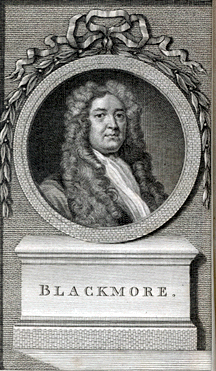Book I, opening lines
Creation (1712)
Famous Richard Blackmore Quotes
"An Essay upon False Vertue", p. 263
Essays Upon Several Subjects (1716)
"An Essay upon False Vertue", p. 262
Essays Upon Several Subjects (1716)
Essay upon Wit http://www.gutenberg.org/files/13484/13484-8.txt (1711)
Preface to King Arthur http://d.lib.rochester.edu/camelot/text/blackmore-king-arthur-I (1697)
